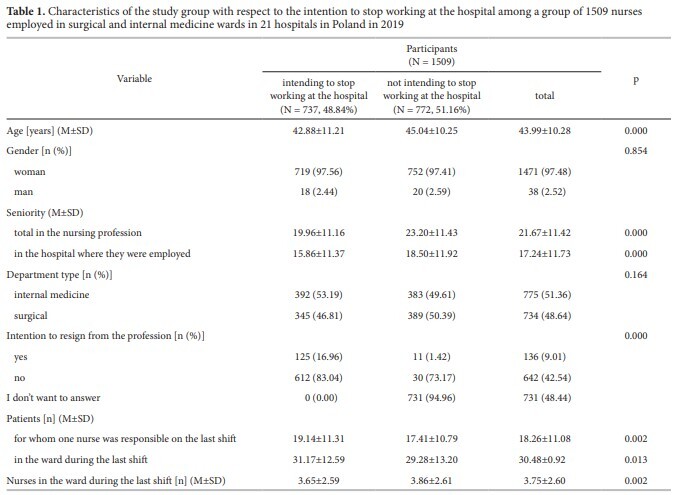Online first
Current issue
Archive
Most cited in 2024
About the Journal
Editorial Office
Editorial Board
Copyright and self-archiving policy
Information clause on the processing of personal data
Declaration of accessibility
Instructions for Authors
Instructions for Reviewers
Contact
Reviewers
2024
2023
2022
2020
2021
2019
2018
2017
2016
2015
2014
2013
Editing and translations
ORIGINAL PAPER
Nurses’ intention to leave their jobs in relation to work environment factors in Polish hospitals: Cross-sectional study
1
Jagiellonian University Medical College, Kraków, Poland (Faculty of Health Sciences, Institute of Nursing and Midwifery)
Online publication date: 2023-12-07
Corresponding author
Iwona Malinowska-Lipień
Jagiellonian University Medical College, Faculty of Health Sciences, Institute of Nursing and Midwifery, Kopernika 25, 31-501 Kraków, Poland
Jagiellonian University Medical College, Faculty of Health Sciences, Institute of Nursing and Midwifery, Kopernika 25, 31-501 Kraków, Poland
Med Pr Work Health Saf. 2023;74(5):377-87
KEYWORDS
TOPICS
ABSTRACT
Background: The lack of nursing staff is a current problem not only in Poland, but also in the world. The decision of nurses to leave the workplace, apart from the financial aspect, often results from unfavourable working conditions related to the work environment. Material and Methods: The study was multicentre, cross-sectional. The study was conducted among a group of 1509 nurses employed in surgical and internal medicine wards in 21 hospitals in Poland. The key variables of the study were: the intention of the nurses to leave their jobs, the nurses’ working environment, the level of satisfaction, the level of occupational burnout and the number of patients cared for on the last shift, the number of nurses on the last shift. The Practice Environment Scale of the Nursing Work Index (PES-NWI) and the Maslach Burnout Inventory (MBI) questionnaire were used in the research. Results: Almost half of the surveyed nurses (48.84%) declared their willingness to leave their current workplace. The statistical analysis showed that nurses declaring their willingness to quit their job in the hospital where they were employed were significantly younger (42.88 vs. 45.04, p = 0.000), had shorter total length of service overall (19.96 vs. 23.20), and also in the hospital where they were employed (15.86 vs. 18.50, p = 0.000). The increase in the number of patients by one was significantly associated with a 1% increase in the risk of leaving work (OR = 1.01, 95% CI 1.00–1.02). An increase in emotional exhaustion significantly increased the risk of leaving work by 2% (OR = 1.02, 95% CI 0.99–1.03). Conclusions: Younger age of nurses, greater workload resulting from more patients and occupational burnout – emotional exhaustion is correlated with the risk of leaving work in the hospital. A lower risk of leaving the job is associated with a higher level of job satisfaction in the hospital, salary and promotion opportunities. Med Pr Work Health Saf. 2023;74(5):377–87.
Share
RELATED ARTICLE
We process personal data collected when visiting the website. The function of obtaining information about users and their behavior is carried out by voluntarily entered information in forms and saving cookies in end devices. Data, including cookies, are used to provide services, improve the user experience and to analyze the traffic in accordance with the Privacy policy. Data are also collected and processed by Google Analytics tool (more).
You can change cookies settings in your browser. Restricted use of cookies in the browser configuration may affect some functionalities of the website.
You can change cookies settings in your browser. Restricted use of cookies in the browser configuration may affect some functionalities of the website.






